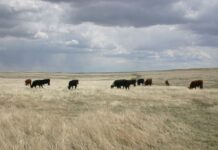K-State’s Price reflects on growth of health programs in Kansas
MANHATTAN, Kan. – A K-State Research and Extension specialist who has helped promote healthy lifestyles in Kansas for more than three decades said the willingness of many agencies to work together on health issues has paid dividends for the state’s communities.
Gayle Price is currently the state leader for Dining with Diabetes, a program that addresses a disease affecting 1 in 10 adults in Kansas and the United States.
The program she manages has benefitted from a network of nearly 50 trained extension agents that teach the class across Kansas.
“The cost of medical care for individuals with diabetes is more than 2 ½ times more than someone who doesn’t have the disease,” said Price, a licensed dietitian and family and consumer sciences specialist in K-State Research and Extension’s southeast area office.
“It’s a costly disease.”
Dining with Diabetes, she said, was developed from a national program that K-State Research and Extension professionals have been involved with for many years. The current version of the program is offered in person and online.
“The majority of people diagnosed with diabetes have Type II diabetes, which can be self-managed with a healthier lifestyle,” Price said. “That might mean selecting healthier foods, watching your carbohydrates and caloric intake, being more physically active or reducing your stress.”
Dining with Diabetes, she added, is an example of a program that relies on many people to reach Kansans who need the information.
“(K-State’s) extension programming has moved away from a university expert model, and more toward people and organizations connection with people in communities,” Price said. “Together, those groups identify issues that are important to them and how within the community, they can work together to impact health outcomes in a positive way.”
Price, who will retire later this year after a 35-year career in Kansas’ extension system, said she has seen partnerships work successfully with programs that address opioid addiction; food insecurity; child nutrition and wellness; physical activity; and more.
“As an extension agent, I always say we’re a change agent,” she said. “We try to stay up on the current science and information so we can provide accurate information to the public (and) help them make informed decisions about their situation.”
More information on programs available through K-State Research and Extension is available at offices located in every Kansas county.
-30-
FOR PRINT PUBLICATIONS: Links used in this story
Dining with Diabetes, https://www.k-state.edu/diningwithdiabetes
K-State Research and Extension statewide offices, https://www.ksre.k-state.edu/about/statewide-locations.html
K State Research and Extension is a short name for the Kansas State University Agricultural Experiment Station and Cooperative Extension Service, a program designed to generate and distribute useful knowledge for the well being of Kansans. Supported by county, state, federal and private funds, the program has county extension offices, experiment fields, area extension offices and regional research centers statewide. Its headquarters is on the K State campus in Manhattan. For more information, visit www.ksre.ksu.edu. K-State Research and Extension is an equal opportunity provider and employer.
Written by:
Pat Melgares
785-532-1160
[email protected]
For more information:
Gayle Price
620-820-6123
[email protected]




